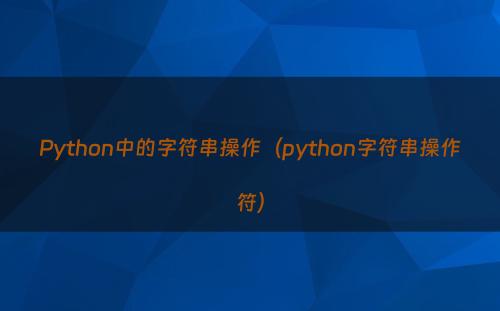在Python中,字符串是一种非常常见的数据类型,同时也提供了丰富的字符串操作方法。以下是一些常见的字符串操作:
字符串的创建:

string1 = "Hello, Python!"
string2 = 'Single quotes also work.'
string3 = """Triple quotes allow
multiline strings."""字符串的基本操作:
# 字符串拼接
result = string1 + " " + string2
# 字符串复制
copied_string = string1 * 3
# 获取字符串长度
length = len(string1)
# 判断字符串是否包含子字符串
contains_hello = "Hello" in string1
# 获取字符串的某个字符
first_char = string1[0]字符串的切片:
substring = string1[7:12] # 获取子字符串,结果为 "Python"字符串的格式化:
name = "John"
age = 25
formatted_string = f"My name is {name} and I'm {age} years old."字符串的分割和连接:
# 分割字符串
words = string1.split(",") # 结果为 ['Hello', ' Python!']
# 连接字符串列表
joined_string = " ".join(words) # 结果为 'Hello Python!'字符串的查找和替换:
# 查找子字符串的位置
index = string1.find("Python") # 结果为 7
# 替换子字符串
new_string = string1.replace("Python", "World") # 结果为 'Hello, World!'字符串的大小写转换:
# 转换为小写
lowercase_string = string1.lower()
# 转换为大写
uppercase_string = string1.upper()字符串的去除空格:
# 去除首尾空格
trimmed_string = " Some text with spaces ".strip()这些是Python中字符串的一些基本操作,字符串是编程中不可或缺的数据类型,了解和熟练使用字符串操作方法有助于编写更灵活、高效的代码。
